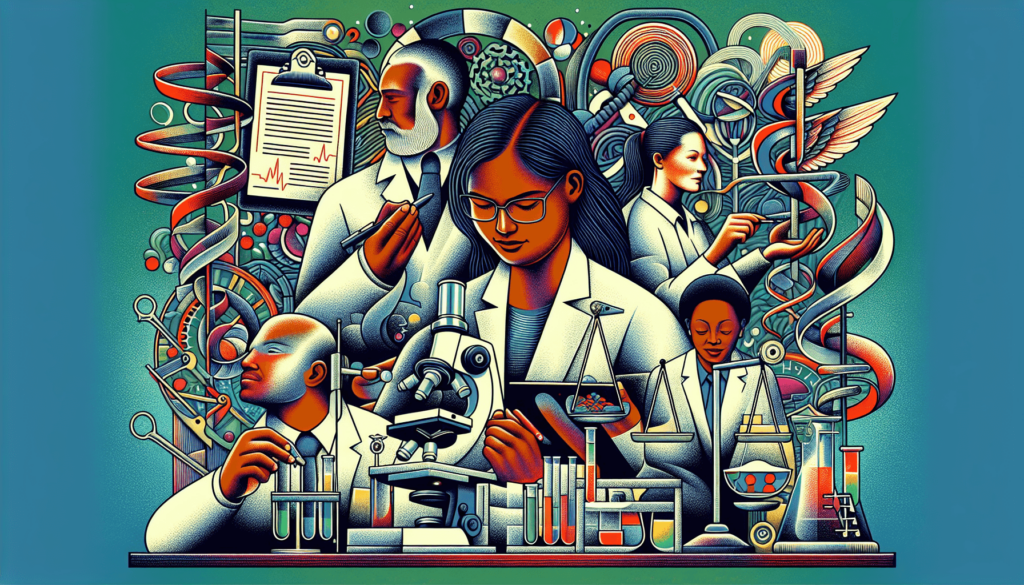Thinking about a career in pharmaceuticals? It’s more than just science – it’s a diverse field ripe with opportunities for growth, innovation, and contributing to public well-being. Discover the roles, skills, and pathways that shape a fulfilling career in pharmaceuticals, whether you’re starting out or seeking a new direction in your professional journey.
Key Takeaways
- The pharmaceutical industry offers a stable and rewarding career path, incorporating roles in innovation, clinical trials, regulatory affairs, and diverse specializations, fostering advancements in global healthcare.
- A successful pharmaceutical career requires scientific expertise, strong communication, regulatory knowledge, and continuous professional development, alongside interdisciplinary skills such as finance and marketing knowledge.
- Educational pathways in the pharmaceutical industry typically begin with a life sciences bachelor’s degree, with opportunities for further specialization through advanced degrees and professional certifications to achieve higher-level positions.
Exploring the Pharmaceutical Industry Landscape

As a known power in global health, the pharma industry, also known as the pharmaceutical industry, significantly influences health outcomes across the globe. Offering resilience against economic fluctuations, this sector provides stability and fulfillment, inviting professionals to pioneer alongside leading firms.
A successful career in Pharma demands a blend of innovation, flexibility, and problem-solving, coupled with an interest in pharmaceuticals and business acumen.
The Role of Pharmaceutical Companies
In the realm of health care , these companies and medical device industries take the lead. One such pharmaceutical company, along with others, creates new medications and medical devices, improving patient health outcomes through innovative medical device manufacturing. For instance, Foundation Medicine developed an FDA-approved test kit to tailor treatments based on individual tumor profiles. Simultaneously, Intellia Therapeutics is revolutionizing personalized medicine by creating treatments for chronic diseases through genome editing.
Additionally, Medical Science Liaisons play a pivotal role in educating healthcare providers about new products and therapies, bridging the gap between drug discovery and clinical practice.
Clinical Trials and Development
The pharmaceutical industry rests on the pillar of clinical trials and development. Here, professionals like clinical research associates, including a clinical research associate, ensure smooth operations while maintaining regulatory compliance and ensuring data integrity.
Their combined efforts with external partners have improved clinical data analysis and reporting, leading to improvements in drug development efficiency.
Regulatory Affairs and Compliance
Regulatory Affairs and Compliance have a role in the pharmaceutical industry by certifying products meet government regulations. Professionals must have a thorough knowledge of regulations, compliance, and legal matters to adhere to industry laws and guidelines. Regulatory Affairs Specialists are responsible for developing regulatory strategies, preparing submissions, educating medical professionals, and working with regulatory agencies.
The Spectrum of Pharmaceutical Careers

Career opportunities in the pharmaceutical industry span across a diverse range, including:
- Research and development
- Sales
- Marketing
- Quality control
New roles like Transformation Leaders, Ecosystem Leaders, and Enabling Leaders are emerging to adapt to sector changes.
Whether you have a deep understanding of pharmaceutical or chemical science or you’re a natural at sales and marketing, there’s a place for your unique skills and passion in this industry.
Research and Innovation
Professionals such as R&D Scientists, Biostatisticians, and Medicinal Chemists have a pivotal role within the domain of scientific research and innovation.
- R&D Scientists are the leaders in drug discovery and enhancement, contributing significantly to medical science advancements.
- Biostatisticians support these endeavors by designing experiments and interpreting data.
- Medicinal Chemists focus on developing and testing new therapeutic compounds, a fundamental aspect of pharmaceutical R&D.
Sales, Marketing, and Outreach
Individuals skilled in communication skills and possessing a profound knowledge of pharmaceutical products flourish within the sales, marketing, and outreach sector. Pharmaceutical Sales Representatives promote and sell products to health care professionals. On the other hand, Medical Affairs professionals must convey complex medical knowledge clearly, demonstrating product value to health care practitioners and stakeholders.
Building and sustaining professional relationships through skillful communication is key to repeated business in the pharmaceutical industry.
Quality Control and Assurance
Through inspections, tests, audits, and root cause analyses, Quality Control and Assurance professionals guarantee the safety and quality of pharmaceutical products. Through their efforts, pharmaceutical products adhere to strict quality and safety standards from manufacturing to product release.
Educational Pathways to Pharma Success

Initiating a pharmaceutical career typically begins with a bachelor’s degree in pharmacy, chemistry, biology, or a related field. As you progress, pursuing advanced degrees and continuous professional development can open doors to specialized roles and higher-level positions.
Undergraduate Studies
An undergraduate degree in a life sciences field paves the way for entry-level positions in the pharmaceutical industry. Whether you’re a Chemist or a Chemical Engineer, your degree in chemistry or biochemistry sets you on the path to becoming a pharmaceutical scientist.
For those eyeing managerial positions, a bachelor’s degree in business management is often a prerequisite.
Advanced Degrees and Specializations
Pursuing advanced degrees like a Master’s or PhD empowers professionals to delve deeper into specializations, potentially leading to advanced roles in research, clinical development, and management. For instance, roles as a biomedical researcher within a university generally require a PhD.
Meanwhile, the medical science liaison, who bridges communication between clinical development and health care professionals, typically holds a doctorate degree in the life sciences.
Continuous Professional Development
In the constantly changing pharmaceutical sector, continuous professional development remains indispensable. Whether you’re an early-career professional establishing lifelong learning habits or a mid-career professional seeking to stay updated with regulatory changes, continuous professional development can help you adapt and thrive in this dynamic industry.
Essential Skills for Pharma Professionals

Building a successful pharmaceutical career requires a combination of hard and soft skills. Some key skills to focus on include:
- Strong scientific or medical background
- Familiarity with finance, accounting, and marketing
- Effective communication skills
- Aptitude for scientific understanding
- Application of technical knowledge
By developing these skills, you can increase your chances of success in the pharmaceutical industry.
Additionally, strategic thinking, creative problem-solving, risk evaluation, and decision-making skills are vital across different roles within the pharmaceutical industry.
Scientific Expertise and Technical Acumen
Achieving success in the pharmaceutical industry requires scientific expertise and technical acumen. Prospective pharmaceutical professionals must specialize deeply in a particular scientific area to gain a comprehensive understanding vital for their field. As technology advances and health care needs expand, expertise in biomedical fields is increasingly essential.
Communication and Teamwork
Mastering effective communication and teamwork forms a cornerstone of success in the pharmaceutical industry. Professionals must excel in interpersonal communication skills to effectively engage and transmit complex scientific concepts to their intended audiences. The ability to navigate conflicts and foster a harmonious team environment is also crucial, as diverse opinions and perspectives are commonplace in this field.
Regulatory Knowledge and Ethical Standards
In the pharmaceutical industry, regulatory knowledge and compliance with ethical standards carry significant importance. Professionals must have a clear understanding of regulatory guidelines to maintain the integrity and safety of pharmaceutical products.
Commitment to ethical practices, exemplified by strict adherence to regulatory standards, is crucial to protect public health.
Transitioning to a Career in Pharmaceuticals

The journey to a pharmaceutical career involves harnessing one’s skills and passions. Professionals from various backgrounds, including doctors, have successfully transitioned to rewarding careers in Pharma. The transition requires an adjustment in mindset and a focus on establishing credibility in this competitive sector.
Identifying Transferable Skills
Recognizing transferable skills marks an essential step while transitioning to a pharmaceutical career. A structured career planning process that involves self-assessment of interests and skills can help align personal interests with a pharmaceutical career.
Navigating the Job Market
As part of transitioning to a pharmaceutical career, understanding the job market holds significance. Understanding the most in-demand roles is a vital first step toward a fulfilling and impactful career.
Structuring the job hunt and overcoming challenges can lead to a successful career, as exemplified by a pharmacist who transitioned from retail to industry.
Building a Network in Pharma
Establishing a network in the pharmaceutical industry can offer insightful perspectives and unlock new opportunities. Connections with former preceptors, for instance, can help explore new career paths.
Real-Life Success Stories
Actual success stories offer a testament to the potential for substantial career progression and impact within the pharmaceutical industry. These stories highlight the journey of individuals who have leveraged their skills and professional development to achieve significant career growth in the pharmaceutical industry.
From Lab Bench to Leadership
One such journey is a progression from a lab bench to leadership. Starting with a focus on lab research, this professional quickly gained recognition for an innate talent for:
- identifying new drug targets
- overcoming challenges in drug development, like securing project funding amidst financial constraints
- overcoming technological hurdles in scaling up medication production
This professional persisted through initial trial failures to achieve a major breakthrough in patient outcomes.
This journey culminated in a transition to a leadership role, directing company-wide research initiatives.
Breaking New Ground in Biotech
Innovative companies like:
- Notable Labs
- Spero Therapeutics
- Semma Therapeutics
- Samumed
Pharmaceutical and biotechnology companies, often referred to as pharma companies, are shaping the future of pharmaceutical research and development. Each of these companies has its own inspiring story of breaking new ground in biotech, from tackling antibiotic resistance in Gram-negative infections to developing exosome technology for diagnostics and advanced therapies.
Aligning Passion with Profession
It is essential to match personal passions with a professional trajectory in the pharmaceutical industry. A broad range of interests can be catered to within the pharmaceutical industry, and finding an exact match with one’s education is not always necessary for career satisfaction.
Gaining knowledge of the diverse roles available in the pharmaceutical industry is beneficial for identifying career paths that resonate with personal passion.
Summary
In conclusion, the pharmaceutical industry offers a plethora of opportunities for a rewarding career. A blend of technical acumen, scientific knowledge, regulatory compliance, and continuous professional development is key to success in this field. Whether you’re a scientist on the verge of discovery, a sales expert influencing healthcare outcomes, or a regulatory professional ensuring safety, the pharmaceutical industry has a place for your unique skills and passion. So, are you ready to embark on a fulfilling career where you can make a tangible difference in global health?
Frequently Asked Questions
You typically need an undergraduate degree in pharmacy, chemistry, biology, or a related field for entry-level positions in the pharmaceutical industry. Advanced degrees can lead to specialized or higher-level roles.
In the pharmaceutical industry, professionals need scientific expertise, technical acumen, effective communication, teamwork, regulatory knowledge, and ethical standards to succeed.
To transition to a career in the pharmaceutical industry, identify your transferable skills and align them with the industry. Building a strong network and navigating the job market effectively will also support this transition.
The pharmaceutical industry offers a diverse range of opportunities in research and development, sales, marketing, quality control, and more, making it an attractive field for professionals seeking various roles.
A career in pharmaceutical research involves drug discovery, development, and enhancement, with roles such as R&D Scientists, Biostatisticians, and Medicinal Chemists being crucial in this field.



